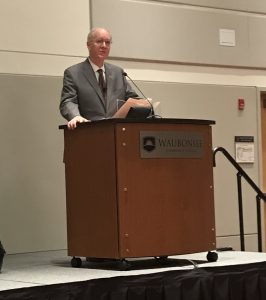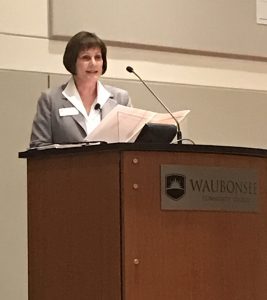Suburban reps talk immediate needs, long-term fixes for student debt
By Erika Wurst For Chronicle Media — August 9, 2019

U.S. Rep. Bill Foster (D-17th) speaks to parents and students at a discussion on student debt held Aug. 5 at Waubonsee Community College. The congressman said American needs to “look harder at how we’re going to get out of this mess.” (Photo by Erika Wurst/for Chronicle Media)
Local U.S representatives, leaders of both public and private college institutions, and concerned parents and students gathered at Waubonsee Community College in Sugar Grove Aug. 5 to discuss a theme affecting them all — crippling student debt.
The roundtable discussion, hosted by Rep. Bill Foster (D-17th) and Rep. Lauren Underwood (D-14th), was aimed at helping students and parents understand the ramifications of applying for student loans, as well as offering solutions to make the need to do so less of a burden on students and families.
With accumulative student loan debt now topping $1.5 trillion, it was important for local leaders to have and honest discussion on how to make sure higher education is both affordable and accessible for all Americans.
“We need to do a better job of educating all of us about the different options students have when they attend college,” said Christine Sobek, president of WCC. She said students are lacking the financial literacy needed to make decisions regarding loans and in choosing what higher education institution to attend.
“Students aren’t as aware as they could be about the resources that are out there,” Sobek said, pointing toward scholarships, Advanced Placement High School credits, and grants that are available to them.
Foster explained to the crowd that when he attended school at the University of Wisconsin, he was able to work enough himself to afford his $2,500 per semester tuition. With rising costs of higher education, that feat now seems unfeasible, forcing students to take out large loans that are difficult to pay back.
“We have to look hard at how we got into the situation we are in now, and look harder at how we’re going to get out of this mess,” Foster said. “I’m committed to working with my colleagues to make sure college is affordable and accessible to anyone who wants it.”

Waubonsee Community College President Christine Sobek speaks at a Aug. 5 forum on addressing student loan debt at the WCC Sugar Grove campus. (Photo by Erika Wurst/for Chronicle Media)
Underwood echoed Foster’s sentiment, saying she’s “gravely concerned about the amount of debt students are left with straight out of college.”
“Higher education is far too unaffordable for many Americans,” she said, also noting a confusing and complicated financial aid process which hinders students from applying for aid.
Students graduating with high student loan debt are putting off buying homes, getting married, and having children. None of these things are beneficial to the country or the economy.
“We certainly have a lot of work to do on this matter,” Underwood said. “What do the solutions look like? How can we address the short- and long-term effects of the student debt crisis?”
Katharine Gricevich, director of Government Relations at the Illinois Student Assistance Commission, said students will be able to take on less debt by figuring out before entering college what career path they want to take.
Switching majors or wandering through the college process will cause students to accumulate more debt or not graduate at all.
“If you limit the time it takes you to get through college, you limit the risk of default on your loans,” Gricevich said. “You should also take into account cost when choosing a college.”
Starting a college journey at a community college or public institution is a route many students take to shave off costs.
Audience members talked about a lack of hope students have after graduation. Many expect to swiftly move into a a field they spent four years preparing to enter, only to find themselves working retail jobs instead.
“How do you give hope that when these kids get out there there will be a job for them and they can pay off their debt?” an audience member asked.
Sobek said those lacking hope can contact WCC, which specializes in putting job seekers in touch with fields and companies looking for employees.
Sobek also seeks to embed a topic to new student orientation programs that helps prospective students understand things they might not have learned in high school, like applying for college loans.
“We’re learning that students don’t understand a lot of things like how to take out a loan, how to buy a car, things that used to be taught in high school that aren’t taught anymore,” Sobek said. “These are things all students need to understand to be successful in our economy…student equity and success is one of our priorities.”







